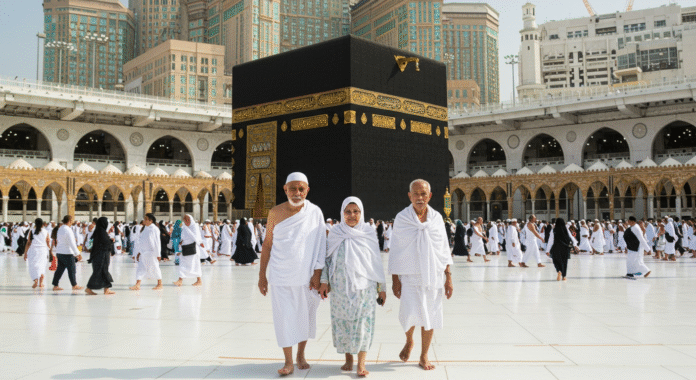Govt Hajj Scheme 2025 applicants are being warned and urged to keep their keen eyes on their second installment date but in case if they miss it, they will miss the chance the chance of pilgrimage of religious obligation for the next coming year. According to the 24NewsHD TV detailed report of Wednesday, a fresh reminder has been sent from the Ministry of Religious Affairs, in which they have informed that all the successful has to deposit seal money amount of second installment before the uploaded deadline frame (November 3-10). Those persons who miss their chance to deposit their amount in the given timeframe will automatically lost their chance for religious obligation pilgrimage and will notify for collecting and refunding their first installment amount from the bank without any further significant notice.
The ministry stressed that the Hajj process is going ahead and proceeding with full transparency and as claimed to the organization nationwide, so as not to have any names of non-serious or uncompromising individuals would be arranged in the final list. So, for the pilgrims who opted and wanted to be in Government Hajj Scheme, the depositing of second installment is most important to secure and safe their seat in the first list. One negligence or unserious behavior, and even a little delay in depositing the amount or you could miss out for life in the list of pilgrims candidates going to the Saudi Arabia this year for religious obligation through government quota.
For the convenience of the public and the people 14 banks have been chosen by the Ministry of Religious Affairs throughout the country as stop-gap measures to allow candidates an easier way of getting their instalments in on time. For the convenience of candidates from both rural and urban areas during the pilgrimage season, private and public banks have been chosen. In the case of purchasing a second ticket under the formal category, a deposit on demand of 650,000 Pakistani rupees is now due. This additional charge will cover a substantial part of all their living expenses while away including fare and board required for Hajj as well as services such as travel guides and buses which pilgrim needs but cannot pay for themselves. In this way, pilgrims who paid the 180,000 Pakistani rupees for transportation and meals were still left with a 6500 rupee deficit over actual living expenses.
Meanwhile, the application process for a private Hajj arrangement has already been opened up which leaves people more options and a say in whether they should be made to conform to the rules of another. In the meantime, the government packages are the lowest priced and best-organised types among candidates for this year’s Pakistani pilgrims, particularly those relying on state institutions to minimize their costs, harassment and trouble.
The government is providing additional living facilities this year for pilgrims in the form of multi-level sub-economy villas coming from different ministries or yeomen hostels. Those staying in double bedrooms will have to pay a further two lakh Pakistani rupees (200,000 PKR) each while those staying in triple bed rooms (three beds) are requested to give 67 thousand Pakistani Rupees (67,000 PKR) per person as an extra charge.
Officials also confirmed that applicants were at liberty to change their hotel reservation during the second instalment payment period. It is this kind of flexibility, that is important for people to be able to take their future plans specific circumstances into account as well as their immediate domestic needs for food, education, and other matters. But the Ministry warned that no changes or refunds would be allowed thereafter. In other words, after the second payment is made to banks they cannot be taken out except for those people who are thinking of paying cash on the day before shopping time really starts! Therefore, everybody is advised to look over procedures and select well before making that payment. No rash decisions please.
As the men at the department of religion readily point out in a letter here dealing with this subject, it is essential that people get together and make completely transparent any rules that have been written up for Hajj 2025. In the last few years the Ministry of Religion has pursued many reforms, including registration through data base and payment verification from banks which is now online too This solid online system offers the applicants a good way for non-moral action. These steps are taken in order to check fraud and deception, mismanagement and favouritism; that all those who deserve fair treatment will be given just that whether they are walking on merit or as a matter of quotas.
This is one of the five pillars of Islam; Hajj is a mandatory religious journey every physically and financially able Muslim have must undertake at least once in their lifetime to perform Hajj. It is the dream for most Pakistanis to do Hajj so they are saving for it their entire lives through the government policies. So, apart from the financial losses, a missed payment deadline would also be a bitter emotional disappointment for thousands of prospective pilgrims.
Over the years, cost of the pilgrimages has soared. High inflation and increasing airfare, plus places like Saudi Arabia, where they seem to put hotels up in season with four people sharing one room have all driven costs up. Additionally, a Moharrar to get better through his encounters with reality that work is now often done for free. Shockingly, University and Government officials charge fees for everything-even ordinary activities like going to the post office.
Qadri continued that these were only modest changes which barely seemed worth noting on paper–let along a comparison to such severe build. Meanwhile, Qadri said, other changes had been carried through if more fully. In particular, an educational-reform program was written and started on 1 January next year. And at that time, a constituency-based council was getting ambitions to move toward liberal–democratic goals.Then in later years Qadri kept on making such changes. Superficial and meaningless though these developments may seem, they nonetheless indicated a commitment to the ongoing renaissance of Chinese learning.



